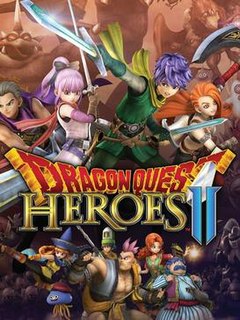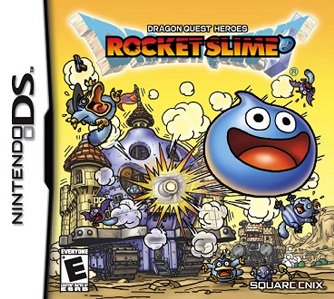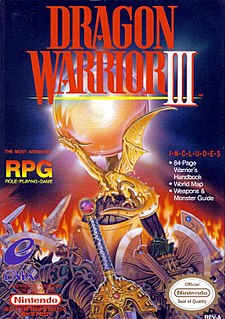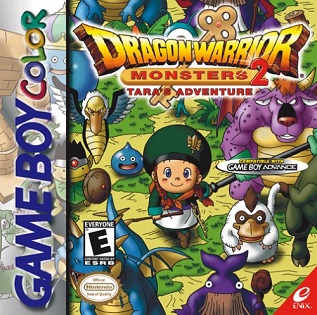 W
WDerby Stallion —also known in Japan by the portmanteau abbreviation DerbyStal —is a series of genre-merging horse-racing and business simulation games originally created by ASCII. The series comprises 21 games, spans more than 10 console platforms, and is the best-selling horse racing series of all time with total sales topping more than 5 million in Japan.
 W
WDragon Quest, titled Dragon Warrior when initially localized to North America, is the first role-playing video game (RPG) in the Dragon Quest media franchise. It was developed by Chunsoft for the Family Computer and published by Enix in Japan in 1986 as Dragon Quest and by Nintendo in 1989 in North America for the Nintendo Entertainment System. Dragon Quest has been ported and remade for several video game platforms, including the MSX, PC-9801, Super Famicom, Game Boy Color, Nintendo 3DS, PlayStation 4, mobile phones, and Nintendo Switch as of 2019. Players control a hero character who is charged with saving the Kingdom of Alefgard and rescuing its princess from the evil Dragonlord. Dragon Warrior's story became the second part in a trilogy. Several more anime and manga series, which revolve around this overarching plot were created.
 W
WDragon Quest Builders is a sandbox action role-playing game developed and published by Square Enix for the PlayStation 4, PlayStation 3, PlayStation Vita, and published by Nintendo for Nintendo Switch.
 W
WDragon Quest Builders 2 is an action role-playing sandbox game developed by Square Enix and Omega Force, with Square Enix publishing it. It is the sequel to Dragon Quest Builders, and was released for the Nintendo Switch and PlayStation 4 in Japan in December 2018 and worldwide in July 2019, and for Microsoft Windows in December 2019. The game shipped over a million copies by August 2019, and received generally favorable reviews from critics.
 W
WDragon Quest Characters: Torneko no Daibōken 3 – Fushigi no Dungeon is the third game in the Torneko series. It is part of the Mystery Dungeon series and contains randomly generated dungeons and uses turn-based action combat. It is the third Dragon Quest spin-off game in the Mystery Dungeon series. The game was also made for the Game Boy Advance, called Dragon Quest Characters: Torneko no Daibouken 3 Advance, in 2004.
 W
WDragon Quest Heroes II is a hack-and-slash game developed by Omega Force and published by Square Enix for PlayStation 4, PlayStation 3, PlayStation Vita, Nintendo Switch, and Microsoft Windows. It was released in Japan in May 2016, and worldwide in April 2017. The game is a sequel to Dragon Quest Heroes: The World Tree's Woe and the Blight Below.
 W
WDragon Quest Heroes: Rocket Slime is an action-adventure game developed by Tose and published by Square Enix for the Nintendo DS handheld video game console. It is the sequel to Slime MoriMori Dragon Quest: Shōgeki no Shippo Dan for the Game Boy Advance. It was first released in Japan, and later in North America. It is a spin-off of the Dragon Quest series.
 W
WDragon Quest Heroes: The World Tree's Woe and the Blight Below is a hack and slash game developed by Omega Force and published by Square Enix. It was released for PlayStation 3 and PlayStation 4 in Japan in February 2015, and in North America, Australia and Europe only for PlayStation 4 in October 2015. It was later released for Microsoft Windows in December 2015. The game received generally positive reviews, with a sequel Dragon Quest Heroes II being released in Japan during May 2016. Dragon Quest Heroes would later be released with the sequel in a compilation for Nintendo Switch in Japan.
 W
WDragon Quest II: Luminaries of the Legendary Line, titled Dragon Warrior II when initially localized to North America, is a role-playing video game developed by Chunsoft and published by Enix in 1987 for the Nintendo Entertainment System as a part of the Dragon Quest series. Enix's U.S. subsidiary published the American release, Dragon Warrior II, for the Nintendo Entertainment System in 1990. Dragon Quest II is set one hundred years after the events of the first game.
 W
WDragon Quest III: The Seeds of Salvation, titled Dragon Warrior III when initially localized to North America, is a role-playing video game developed by Chunsoft and published by Enix. It is the third installment in the Dragon Quest series and was first released for the Family Computer (Famicom) in Japan and later for the Nintendo Entertainment System (NES) in North America. The game saw an enhanced remake for the Super Famicom in 1996 and the Game Boy Color in 2001, and a port to mobile phones and the Wii in 2009 and 2011. A version of the game for Android and iOS was released in Japan on September 25, 2014, and worldwide as Dragon Quest III: The Seeds of Salvation on December 4, 2014. It was the first time the game was given an official English subtitle.
 W
WDragon Quest IV: Chapters of the Chosen, titled Dragon Warrior IV when initially localized to North America, is a role-playing video game, the fourth installment of the Dragon Quest video game series developed by Chunsoft and published by Enix, and the first of the Zenithian Trilogy. It was originally released for the Famicom on 11 February 1990 in Japan. A North American NES version followed in October 1992, and would be the last Dragon Quest game localized and published by Enix's Enix America Corporation subsidiary prior to its closure in November 1995, as well as the last Dragon Quest game to be localized into English prior to the localization of Dragon Warrior Monsters in December 1999. The game was remade by Heartbeat for the PlayStation, which eventually was available as an Ultimate Hits game. This was followed with a second remake developed by ArtePiazza for the Nintendo DS, released in Japan November 2007 and worldwide in September 2008. A version based on the Nintendo DS remake for Android and iOS was released in 2014.
 W
WDragon Quest IX: Sentinels of the Starry Skies is a role-playing video game developed by Level-5 for the Nintendo DS. Dragon Quest IX introduced local multiplayer functionality to the series, as well as limited compatibility with Nintendo Wi-Fi Connection. It was also the first to be initially released for a handheld game console, and the first to feature spawning of enemies, rather than random encounters. The game retains many of the series' traditional role-playing elements, such as turn-based combat and a level system based on gaining experience points. The game was designed to be the most difficult one in the series, and was released in Japan by Square Enix in July 2009, and worldwide by Nintendo in July 2010.
 W
WDragon Quest Monsters: Caravan Heart is the third game in the Dragon Quest Monsters series, released only in Japan by Enix for the Game Boy Advance. The game was simultaneously announced with Dragon Quest VIII in Famitsu in 2002. Like the other Dragon Quest titles, development of Caravan Heart was led by Yuji Horii.
 W
WDragon Quest Monsters: Joker is a Nintendo DS role-playing video game developed by TOSE and published by Square Enix. It is the fourth installment of the Dragon Quest Monsters series. Square Enix released the game on December 28, 2006 in Japan and in North America on November 6, 2007.
 W
WDragon Quest Monsters: Joker 2 is a Nintendo DS role-playing video game published by Square Enix. It is the sequel to Dragon Quest Monsters: Joker and is the fifth game in the Dragon Quest Monsters series. It was released in Japan on April 28, 2010 with a United States release on September 19, 2011 with a European release following on October 7, 2011. An expanded version of the game, titled Dragon Quest Monsters: Joker 2 Professional, was released on March 31, 2011. It features new monsters and abilities, with the same story.
 W
WDragon Quest Monsters: Joker 3 is a role-playing video game developed by Square Enix and Tose and published by Square Enix for the Nintendo 3DS. It is the sequel to Dragon Quest Monsters: Joker 2, and is the sixth game in the Dragon Quest Monsters series. It was released in Japan on March 24, 2016.
 W
WDragon Quest V: Hand of the Heavenly Bride is a role-playing video game and the fifth installment in the Dragon Quest video game series, second of the Zenithian Trilogy. Originally developed by Chunsoft and published by Enix Corporation, Dragon Quest V was the first title in the series to be released for the Nintendo Super Famicom video game console in Japan in September 1992. Dragon Quest V was the first game in the series to not be released outside Japan due to programming issues at the time.
 W
WDragon Quest VI: Realms of Revelation is a role-playing video game developed by Heartbeat and published by Enix for the Super Famicom as a part of the Dragon Quest series and as the last Dragon Quest game in the Zenithian Trilogy. It was released in Japan in December 1995, developed by Heartbeat; whereas the previous Dragon Quest games were developed by Chunsoft. In 2011, a remake of the game, along with Dragon Quest IV and Dragon Quest V, was released worldwide for the Nintendo DS, making this the first time the game was released in English. Another version of the game for Android and iOS devices was released in Japan in June 2015.
 W
WDragon Quest VII: Fragments of the Forgotten Past is a Japanese role-playing video game developed by Heartbeat and ArtePiazza, and published by Enix for the PlayStation in 2000. It was released in North America in 2001 under the title Dragon Warrior VII. The game received a remake on the Nintendo 3DS on February 7, 2013 in Japan, which was released in North America and Europe for the Nintendo 3DS under the title Dragon Quest VII: Fragments of the Forgotten Past in 2016. A version of the game for Android and iOS was also released in Japan on September 17, 2015.
 W
WDragon Quest VIII: Journey of the Cursed King, is a role-playing video game developed by Level-5 and published by Square Enix for the PlayStation 2. It was released in Japan in 2004, in North America in 2005 and PAL regions in 2006, making it the first main series installment released in the PAL region. It is the eighth installment of the Dragon Quest series and it is the first English version of a Dragon Quest game to drop the Dragon Warrior title. A version of the game for Android and iOS was released in Japan in December 2013, and worldwide in May 2014.
 W
WDragon Quest Wars is a turn-based strategy video game developed by Intelligent Systems and published by Square Enix for the Nintendo DSi via the systems's DSiWare download service. It is part of the Dragon Quest series and features monsters from the series. It supports up to four player multiplayer, both local and online. Dragon Quest Wars was announced on May 18, 2009, and was released in Japan on June 24, 2009, in North America on September 28, 2009, and in the PAL regions on October 9, 2009.
 W
WDragon Quest X is a massively multiplayer online role-playing game (MMORPG) developed and published by Square Enix. It is the tenth mainline entry in the Dragon Quest series. It was originally released for the Wii in 2012, and was later ported for Wii U, Microsoft Windows, PlayStation 4, Nintendo Switch, Android, iOS, and Nintendo 3DS, all of which support cross-platform play. Outside of a discontinued Windows version in Chinese, the game was not localized outside of Japan.
 W
WDragon Quest XI: Echoes of an Elusive Age is a role-playing video game developed and published by Square Enix. An entry in the long-running Dragon Quest video game series, it was released in Japan for the Nintendo 3DS and PlayStation 4 in July 2017, and worldwide for the PlayStation 4 and Microsoft Windows in September 2018. An enhanced version, Dragon Quest XI S: Echoes of an Elusive Age - Definitive Edition, was released in September 2019 for the Nintendo Switch and will be released for PlayStation 4, Microsoft Windows and Xbox One in December 2020.
 W
WDragon Quest: Monster Battle Road is a series of Japanese arcade games based on Dragon Quest VIII: Journey of the Cursed King. Players battle monsters and can win real-life cards with monster data imprinted on them. The first game, also titled Dragon Quest: Monster Battle Road, was released in 2007 only in Japan, using the Taito Type X2 system. A sequel, Dragon Quest: Monster Battle Road II Legends, was announced at the 2009 Jump Fiesta in Tokyo, and a third game in the series, Dragon Quest: Monster Battle Road Victory, a port of the Legends game, was announced for the Wii in 2010. Dragon Quest: Monster Battle Road Scanner was scheduled release for Arcade in 2016.
 W
WDragon Quest: Young Yangus and the Mysterious Dungeon is a prequel and spin-off to Dragon Quest VIII, developed by Cavia and published by Square Enix as part of the Mystery Dungeon series.
 W
WDragon Warrior Monsters is the first video game in the Dragon Quest Monsters series. It was released in Japan by Enix on September 25, 1998, and co-published by Eidos Interactive in Europe and North America in 2000. It was the first Dragon Quest game to be released in Europe. The game cartridge is compatible with both the black-and-white Game Boy and the Game Boy Color; a second printing of the game was made after the Game Boy Color itself was released. The game was remade for the PlayStation in a compilation Dragon Quest Monsters 1+2 Hoshi Furi no Yūsha to Bokujō no Nakamatachi. A mobile phone incarnation titled Dragon Quest Monsters i was released in Japan on January 28, 2002.
 W
WDragon Warrior Monsters 2, known in Japan as Dragon Quest Monsters 2 , is a role-playing video game published by Enix for the Game Boy Color. It is the second Dragon Warrior Monsters game for the Game Boy Color and features two different versions of the same game, Cobi's Journey and Tara's Adventure. Both games were remade in 2002 for the PlayStation in a compilation game called Dragon Quest Monsters 1+2 and released only in Japan. The Nintendo 3DS version combined both games into one and was released only in Japan in 2014 with the title Dragon Quest Monsters 2: Iru and Luca's Marvelous Mysterious Key.
 W
WE.V.O.: Search for Eden is a side-scrolling action video game developed by Almanic Corporation and published by Enix for the Super Nintendo Entertainment System. Released in 1992 for Japanese audiences, the game was later translated and released in North America in 1993. Combining traditional platforming mechanics with experience and leveling mechanics originating from role playing games, E.V.O.: Search for Eden involves the player navigating a creature through a number of side-scrolling levels while undergoing bodily evolution to cope with ever-changing environments. It is heavily based on Almanic's original title, 46 Okunen Monogatari ~The Shinka Ron~, released exclusively in Japan for the PC-9801 home computer in 1990.
 W
WJesus is a graphic adventure game developed and published by Enix. It was first released in 1987 on the PC-8801, FM-77AV, X1, and the MSX2 and was later ported to the Famicom in 1989 under the title Jesus: Kyōfu no Bio Monster . In 1991, a sequel titled Jesus II was released on the PC-8801, PC-9801, and X68000.
 W
WMystery Dungeon: Shiren the Wanderer is a roguelike video game developed and published by Chunsoft. It is the second entry in the Mystery Dungeon series, following 1993's Torneko no Daibōken. It was originally released for the Super Famicom in 1995 in Japan. Sega published a Nintendo DS remake in 2006 in Japan and in 2008 internationally. The remake was later ported to iOS and Android and published by Spike Chunsoft in 2019.
 W
WShiren the Wanderer 2: Demon Invasion! Shiren Castle is a role-playing video game developed by Chunsoft and published by Nintendo for the Nintendo 64. It is the second main entry in the Shiren the Wanderer series, which is part of the larger Mystery Dungeon series, and was originally released in Japan on September 27, 2000. The game follows Shiren, a boy who aims to defend a village from attacking demons by building a castle; he finds building materials and other items by exploring dungeons.
 W
WThe Slime series is a spinoff series of games from Dragon Quest featuring its Slime character. Three games have been released, the second of which, Dragon Quest Heroes: Rocket Slime, has been released in North America.
 W
WSlime Mori Mori Dragon Quest 3: Daikaizoku to Shippo Dan is an action-adventure game developed and published by Square Enix. It is a spinoff video game to the Dragon Quest series, and the third entry in the Slime subseries. It was released in Japan for the Nintendo 3DS on November 2, 2011.
 W
WTorneko no Daibōken: Fushigi no Dungeon is the first game in the Mystery Dungeon series. It features Torneko, the merchant from Dragon Warrior IV, and his adventures around the Mystery Dungeon in search of items.
 W
WWorld of Dragon Warrior: Torneko: The Last Hope is a role-playing video game for the PlayStation. The game was co-developed by Chunsoft and Matrix Software and published by Enix in both Japan and North America in 1999 and 2000 respectively.